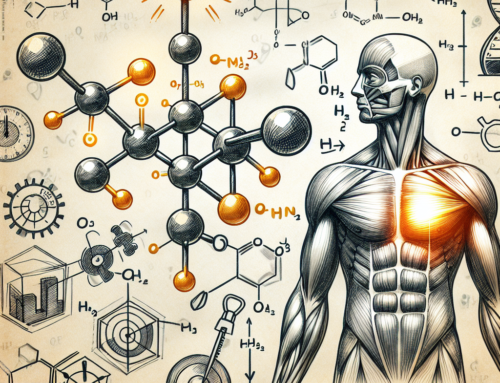“Unlock the power of collagen peptides for radiant skin, strong joints, and overall wellness.”
The Role of Collagen Peptides in Skin Health
Collagen peptides have gained popularity in recent years for their potential benefits in promoting skin health. But what exactly are collagen peptides, and how do they work to improve the appearance and overall health of the skin?
Collagen is a protein that makes up a significant portion of our skin, providing structure and elasticity. As we age, our bodies produce less collagen, leading to wrinkles, sagging skin, and other signs of aging. Collagen peptides are a form of collagen that has been broken down into smaller molecules, making it easier for the body to absorb and use.
One of the key benefits of collagen peptides for skin health is their ability to stimulate the production of new collagen. When collagen peptides are ingested, they are broken down into amino acids and peptides, which are then used by the body to build new collagen fibers. This can help to improve the elasticity and firmness of the skin, reducing the appearance of wrinkles and fine lines.
In addition to stimulating collagen production, collagen peptides also have antioxidant properties that can help to protect the skin from damage caused by free radicals. Free radicals are unstable molecules that can damage the skin cells and accelerate the aging process. By neutralizing these free radicals, collagen peptides can help to prevent premature aging and keep the skin looking youthful and healthy.
Collagen peptides have also been shown to improve the hydration and moisture levels of the skin. As we age, our skin tends to become drier and less supple, leading to a dull and lackluster appearance. Collagen peptides can help to restore moisture to the skin, improving its texture and overall appearance.
Furthermore, collagen peptides have been found to have anti-inflammatory properties that can help to reduce redness and inflammation in the skin. Inflammation is a common cause of skin issues such as acne, eczema, and psoriasis. By reducing inflammation, collagen peptides can help to improve the overall health and appearance of the skin.
Overall, the science behind the benefits of collagen peptides for skin health is clear. These powerful molecules can stimulate collagen production, protect the skin from damage, improve hydration, and reduce inflammation, all of which can lead to healthier, more youthful-looking skin.
Incorporating collagen peptides into your daily routine can be a simple and effective way to support the health of your skin. Whether you choose to take collagen peptide supplements or use skincare products that contain collagen peptides, you can reap the benefits of this powerful ingredient and enjoy a more radiant and youthful complexion.
In conclusion, collagen peptides play a crucial role in promoting skin health by stimulating collagen production, protecting the skin from damage, improving hydration, and reducing inflammation. By incorporating collagen peptides into your skincare routine, you can support the health and appearance of your skin and enjoy a more youthful complexion for years to come.
Collagen Peptides and Joint Function
Collagen peptides have gained popularity in recent years for their potential health benefits, particularly in supporting joint function. But what exactly is the science behind these benefits?
Collagen is the most abundant protein in the human body, providing structure and support to various tissues, including skin, bones, and joints. Collagen peptides are a hydrolyzed form of collagen, meaning they have been broken down into smaller molecules that are more easily absorbed by the body.
One of the key benefits of collagen peptides is their ability to support joint health. As we age, the body’s natural collagen production decreases, leading to a loss of cartilage and joint stiffness. Collagen peptides have been shown to help improve joint function by promoting the production of new collagen and protecting existing cartilage.
Studies have found that collagen peptides can help reduce joint pain and stiffness in individuals with osteoarthritis, a common condition characterized by the breakdown of cartilage in the joints. In one study, participants who took collagen peptides for 12 weeks experienced a significant reduction in joint pain and improved physical function compared to those who took a placebo.
Collagen peptides have also been shown to help improve joint mobility and flexibility. A study published in the Journal of Medicinal Food found that participants who took collagen peptides for 24 weeks experienced a significant improvement in joint flexibility compared to those who took a placebo. This suggests that collagen peptides may help support overall joint function and mobility.
But how exactly do collagen peptides work to support joint health? One theory is that collagen peptides stimulate the production of new collagen in the body, which helps repair and rebuild damaged cartilage in the joints. Collagen peptides may also help reduce inflammation in the joints, which can contribute to joint pain and stiffness.
In addition to promoting joint health, collagen peptides have been shown to have other benefits for the body. Studies have found that collagen peptides can help improve skin elasticity and hydration, promote muscle growth and recovery, and support gut health.
Overall, the science behind the benefits of collagen peptides for joint function is promising. While more research is needed to fully understand how collagen peptides work in the body, the existing evidence suggests that they can help support joint health and improve overall quality of life for individuals with joint pain and stiffness.
In conclusion, collagen peptides have the potential to be a valuable supplement for individuals looking to support their joint health. By promoting the production of new collagen, reducing inflammation, and improving joint mobility, collagen peptides can help alleviate joint pain and stiffness and support overall joint function. As always, it is important to consult with a healthcare provider before starting any new supplement regimen to ensure it is safe and appropriate for your individual needs.
Collagen Peptides and Muscle Recovery
Collagen peptides have gained popularity in recent years for their potential benefits in promoting muscle recovery. But what exactly are collagen peptides, and how do they work to support muscle recovery? To understand this, we need to delve into the science behind collagen peptides and their effects on the body.
Collagen is the most abundant protein in the human body, making up a significant portion of our skin, bones, muscles, tendons, and ligaments. Collagen peptides are a hydrolyzed form of collagen, meaning they have been broken down into smaller molecules that are more easily absorbed by the body. When consumed, collagen peptides can be utilized by the body to support the growth and repair of various tissues, including muscles.
One of the key ways in which collagen peptides support muscle recovery is through their high amino acid content. Amino acids are the building blocks of proteins, and they play a crucial role in muscle repair and growth. Collagen peptides are rich in essential amino acids, such as glycine, proline, and hydroxyproline, which are particularly important for collagen synthesis and muscle tissue repair.
In addition to providing essential amino acids, collagen peptides have been shown to stimulate the production of collagen in the body. Collagen is a structural protein that provides strength and support to muscles, tendons, and ligaments. By increasing collagen production, collagen peptides can help to improve the structural integrity of muscle tissues, making them more resilient to damage and speeding up the recovery process after exercise.
Furthermore, collagen peptides have been found to have anti-inflammatory properties, which can help to reduce muscle soreness and inflammation following intense physical activity. Inflammation is a natural response to exercise-induced muscle damage, but excessive inflammation can delay the recovery process and lead to prolonged muscle soreness. By reducing inflammation, collagen peptides can help to speed up the healing process and promote faster muscle recovery.
Research has also shown that collagen peptides may help to improve muscle strength and performance. A study published in the Journal of the International Society of Sports Nutrition found that athletes who supplemented with collagen peptides experienced a significant increase in muscle mass and strength compared to those who did not. This suggests that collagen peptides may have a positive impact on muscle growth and performance, making them a valuable supplement for athletes and fitness enthusiasts.
In conclusion, collagen peptides have a range of benefits when it comes to supporting muscle recovery. From providing essential amino acids for muscle repair to stimulating collagen production and reducing inflammation, collagen peptides can help to speed up the recovery process and improve muscle strength and performance. Whether you are an athlete looking to enhance your training results or simply someone looking to support your overall health and well-being, collagen peptides may be a valuable addition to your supplement regimen.
About Puriva Nutrition
Puriva formulates personalized, ready-to-eat nutritional products and sells at wholesale pricing, direct to consumers, in our retail location. The products include 2-ounce shots and more than 100 bulk powders including whey protein isolate, collagen peptides, creatine monohydrate, stevia rebaudioside-M, chicory inulin, phytonutrient powder, fruit powders, curcumin, ashwagandha, saffron, HMB, alpha GPC (alpha-glycerophosphocholine), beta-alanine, every essential amino acid, MSM, chondroitin sulfate, citric acid, CoQ10, HMB (hydroxy- methyl-butyrate), magnesium, calcium, potassium, piperine, ginger root, bacopa extract (50% bacosides), boswellia serrata, green tea extract, lemon balm extract, all essential vitamins, citrulline, beet powder, carrot powder, celery powder, and pre-workout powder.






